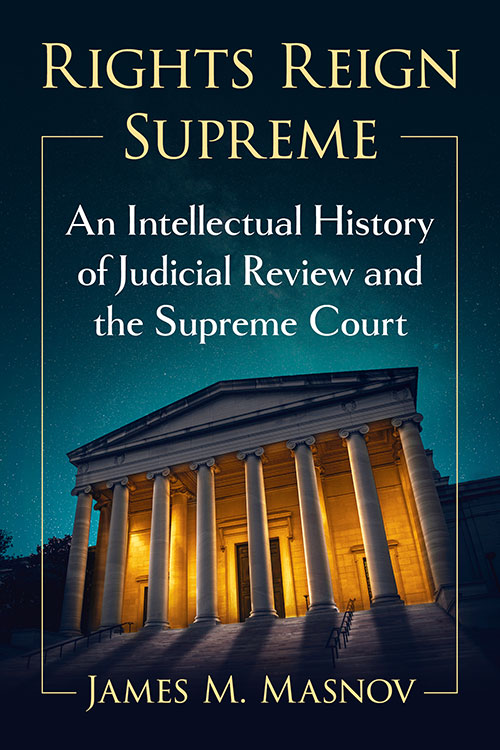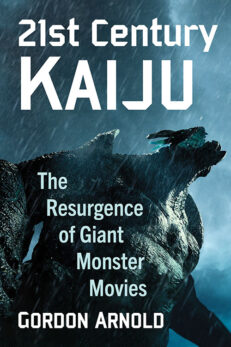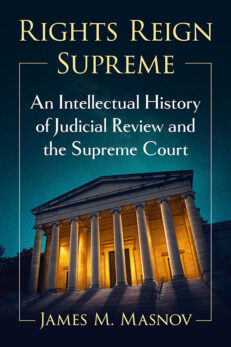Rights Reign Supreme
An Intellectual History of Judicial Review and the Supreme Court
$49.95
In stock
About the Book
Judicial review—the power of the United States Supreme Court to nullify unconstitutional laws—has been attacked and celebrated. The Court’s authority has become even more significant over the past century as it has grown to occupy a more central role in the lives of Americans. The result has been for politicians of both major political parties (as well as scholars) to decry the antidemocratic nature of the judicial power.
This book argues that judicial review ensures the survival of the republic, outlining the Court’s responsibilities as an instrument of rights theory and its history of defending the principles established during the American founding that assert the primacy of certain inherent rights. Centering on the power of judicial review, chapters detail the Court’s reputation as a steward of the Constitution, protecting the rights of the people against the encroachments of the executive and legislative branches—and against the fleeting passions of the people.
About the Author(s)
Bibliographic Details
James M. Masnov
Format: softcover (6 x 9)
Pages: 252
Bibliographic Info: 13 photos, notes, bibliography, index
Copyright Date: 2023
pISBN: 978-1-4766-9052-0
eISBN: 978-1-4766-4825-5
Imprint: McFarland
Table of Contents
Acknowledgments vi
Preface 1
Introduction 5
Chapter One: Primary Source Analysis: Philadelphia Convention, Ratification Debates, and Early Court Cases 21
Chapter Two: Survey of Judicial Review Scholarship 45
Chapter Three: The Sedition Act of 1798 and Nullification, i.e., State Review 66
Chapter Four: Marbury, Stuart, McCulloch, and Barron 82
Chapter Five: Indian Removal and Dred Scott 96
Chapter Six: Privileges or Immunities and the Fourteenth Amendment 118
Chapter Seven: Rights 133
Chapter Eight: Rights Assertions via the Court in the Twentieth and Twenty-First Centuries 154
Conclusion 191
Chapter Notes 209
Bibliography 225
Index 239
Book Reviews & Awards
• “James M. Masnov’s study is a valuable contribution to our understanding of the history of judicial review. His meticulous research into the intellectual history of the principle offers readers a perceptive new way to think about the role of the Supreme Court in American history and life.”—Dr. Tim Alan Garrison, legal historian, author of The Legal Ideology of Removal: The Southern Judiciary and the Sovereignty of Native American Nations
• “It is a remarkably advanced and compelling work of scholarship that treats the history of judicial review from early legal experiments in the eighteenth century, to the transformations occasioned by the Fourteenth Amendment in the nineteenth century, to modern legal and political controversies. Despite its broad chronology and scope, each chapter is remarkably focused and well researched, and engagingly written… [M]ay well become a definitive work in the field.”—Dr. Thomas Luckett, historian, co-author of The Cultural History of Money and Credit: A Global Perspective
• “James Masnov has placed the controversial and timely subject of Supreme Court judicial review in an historical context that provides life to the contention that Americans should abandon this long-standing practice only after the most serious consideration.”—Dr. David Horowitz, historian, author of The People’s Voice: A Populist Cultural History of Modern America
• “James Masnov has crafted a thoughtful, comprehensive, and important analysis of the theory and practice of judicial review in American history. Grounded in sound research and woven into the existing scholarship, Masnov’s book traces the evolution, development, and solidification of judicial review as a fundamental element of American law. Moreover, Masnov’s text is accessible and interesting to a non-specialist audience, and it will be useful for social scientists and humanists practicing outside the field of legal history.”—Dr. Bob Reinhardt, historian, author of The End of a Global Pox: America and the Eradication of Smallpox in the Cold War Era and Struggle on the North Santiam: Power and Community on the Margins of the American West
• “Masnov situates the practice of judicial review in its intellectual foundations, tracing the relationship between rights and courts over a broad span of history. The book draws on a compelling array of primary documents, historians, political scientists, and legal scholars to offer a more nuanced and grounded understanding of the importance of judicial review within the American tradition. By crossing these disciplinary boundaries, Masnov manages to fill an important gap in our grasp of what judicial review means not only historically, but also to our present conflicts.”—Dr. Christopher Shortell, political scientist, and author of Rights, Remedies, and the Impact of State Sovereign Immunity





